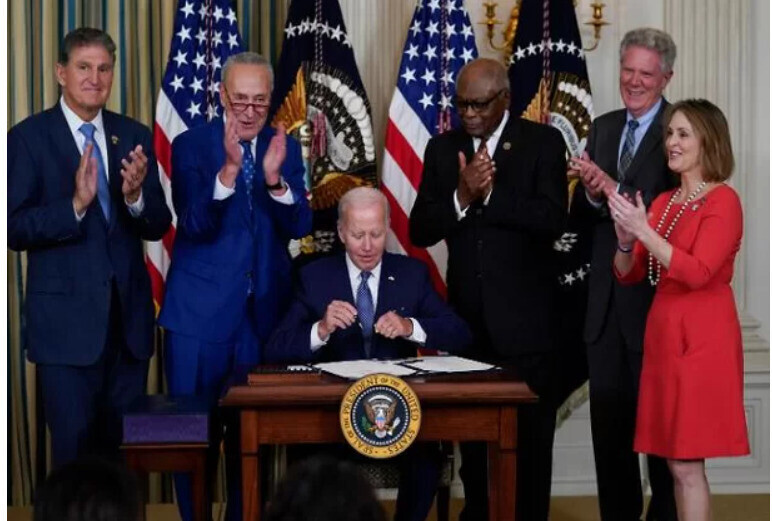hankyoreh
Links to other country sites 다른 나라 사이트 링크
S. Korea considers taking US’ exclusionary EV tax credit scheme to WTO

The South Korean government will be requesting the US government to be flexible in enforcing the Inflation Reduction Act (IRA), which includes measures that discriminate against electric cars manufactured in Korea. Moreover, as Washington’s move may violate international trade norms, Seoul will also consider filing a complaint at the World Trade Organization (WTO) or taking steps for conflict resolution as agreed upon by the South Korea-US Free Trade Agreement (FTA).
While meeting with reporters on Thursday, an official at the South Korean Ministry of Foreign Affairs (MOFA) stated, “[The IRA] basically sets out that cars manufactured in the US will be discriminated from cars manufactured abroad in terms of government subsidies, which may violate the South Korea-US FTA as well as WTO regulations.”
Earlier, on Aug. 16, US President Joe Biden signed the IRA, which boils down to responding to the climate crisis, expanding support for the public health sector, and raising taxes for big corporations.
Specifically, as part of an effort to popularize electric cars as a measure against climate change, the IRA limited cars eligible for government tax credits to cars that are assembled in North America. Foreign car companies that have been exporting electric cars to the US market, including ones from South Korea, will be affected.
“After the bill took effect, [cars made in South Korea] became ineligible for government tax credits, the effect of which is as if the relative price for electric cars made in South Korea suddenly rose by 10 million won,” the MOFA official went on. “Because the legislation happened unprecedently quickly, passing at both chambers of the US Congress and being signed off by the president in only about 10 days, we didn’t even have time to take any measures.”
The IRA, which the US Democratic Party took the lead in passing ahead of the midterm elections this coming November, extensively lays out measures to respond to climate change and stabilize the livelihood of the middle class. Although concerns that the bill will negatively affect the domestic electric vehicle industry are being raised in South Korea, the IRA is reportedly earning favorable responses within the US.
The MOFA official continued, “As [the bill] is drawing favor for the Democratic Party ahead of the midterm elections, it looks like a quick revision of the law will be difficult to achieve, even though the law may be violating international trade norms.”
The South Korean MOFA is using various channels to explain to the US government and US Congress why the relevant clause is discriminatory and request that the law be flexibly enforced, such as through the implementation of a grace period.
The official added, “Although specifics haven’t been discussed yet, we are considering working together with other countries that manufacture electric vehicles and are facing the same problem, such as EU member states and Japan.”
By Jung In-hwan, staff reporter
Please direct questions or comments to [english@hani.co.kr]

Editorial・opinion
![[Column] Life on our Trisolaris [Column] Life on our Trisolaris](https://flexible.img.hani.co.kr/flexible/normal/500/300/imgdb/original/2024/0505/4817148682278544.jpg) [Column] Life on our Trisolaris
[Column] Life on our Trisolaris![[Editorial] Penalties for airing allegations against Korea’s first lady endanger free press [Editorial] Penalties for airing allegations against Korea’s first lady endanger free press](https://flexible.img.hani.co.kr/flexible/normal/500/300/imgdb/original/2024/0502/1817146398095106.jpg) [Editorial] Penalties for airing allegations against Korea’s first lady endanger free press
[Editorial] Penalties for airing allegations against Korea’s first lady endanger free press- [Editorial] Yoon must halt procurement of SM-3 interceptor missiles
- [Guest essay] Maybe Korea’s rapid population decline is an opportunity, not a crisis
- [Column] Can Yoon steer diplomacy with Russia, China back on track?
- [Column] Season 2 of special prosecutor probe may be coming to Korea soon
- [Column] Park Geun-hye déjà vu in Yoon Suk-yeol
- [Editorial] New weight of N. Korea’s nuclear threats makes dialogue all the more urgent
- [Guest essay] The real reason Korea’s new right wants to dub Rhee a founding father
- [Column] ‘Choson’: Is it time we start referring to N. Korea in its own terms?
Most viewed articles
- 1New sex-ed guidelines forbid teaching about homosexuality
- 2OECD upgrades Korea’s growth forecast from 2.2% to 2.6%
- 3[Column] Life on our Trisolaris
- 460% of young Koreans see no need to have kids after marriage
- 5[Guest essay] Maybe Korea’s rapid population decline is an opportunity, not a crisis
- 6Inside the law for a special counsel probe over a Korean Marine’s death
- 7Korean government’s compromise plan for medical reform swiftly rejected by doctors
- 8Months and months of overdue wages are pushing migrant workers in Korea into debt
- 9Two lung cancer deaths at Samsung Electronics deemed occupational in nature
- 10Trump asks why US would defend Korea, hints at hiking Seoul’s defense cost burden